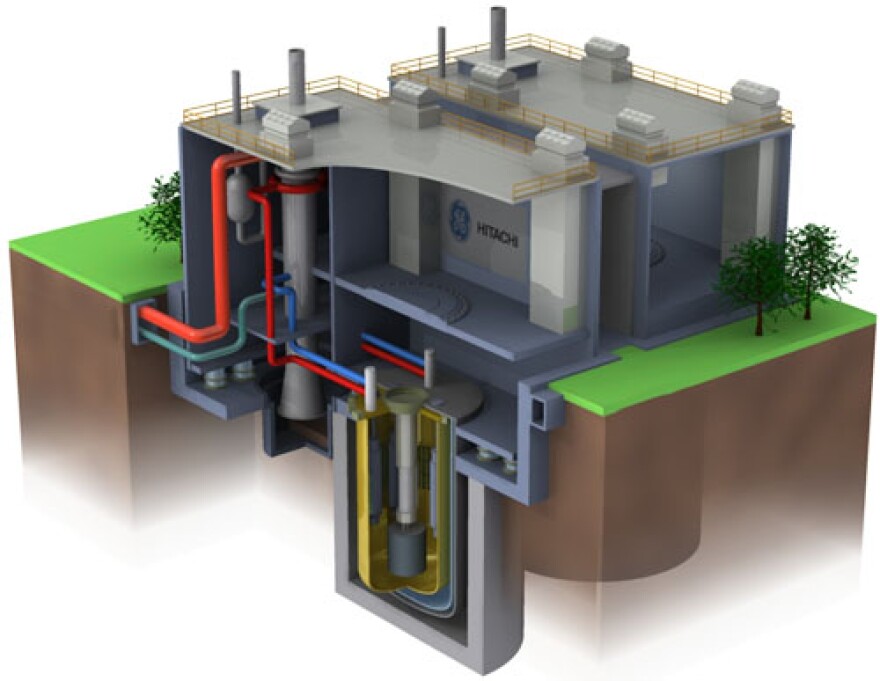One of the final regulatory hurdles before GE-Hitachi receives a 40-year license to enrich uranium in Castle Hayne will happen behind closed doors. Officials with the Nuclear Regulatory Commission have determined that the upcoming evidentiary hearing – which would typically be a public event – will be conducted privately.
It’s the last step in the licensing process for GE-Hitachi. And the Atomic Safety and Licensing Board – a panel that delivers recommendations to the Nuclear Regulatory Commission – will conduct this final review behind closed doors. If a 40-year license to enrich uranium is granted, GE-Hitachi officials still must decide whether its subsidiary – Global Laser Enrichment -- will move forward with construction of a facility. It would be the first uranium enrichment plant in the world to use SILEX technology -- a new process – using lasers instead of centrifuges or gaseous diffusion.
Dr. Per Peterson, Professor and Chair of the Department of Nuclear Engineering at the University of California at Berkeley, says he’s intrigued by the prospect of better, more efficient technology.
“The risks associated with this technology can be balanced against the potential that there could be some positive effects from having improved ability to perform enrichment.”
But it raises the hackles of some nuclear scientists. Dr. Arjun Makhijani, a nuclear scientist and president of the Institute for Energy and Environmental Research, says the fact that it’s a superior process using less energy makes the technology more attractive to potential terrorists or countries with nuclear weapons ambition.
"The centrifuge tech that was built for the Pakistani arsenal which today poses so many security risks came from European blueprints. Even the Manhattan Project which had such vast security precautions—could not guard the design of the bomb. That is a fact.”
GE-Hitachi spokesman Christopher White says countries working on nuclear weapons are using other, simpler processes. White says that alone means the motivation for pursuing GE’s more complicated SILEX technology is low. And says White, there are highly effective safeguards in place.
“You have to realize that if this goes forward, GE will have invested multi-billion dollars in this project. And we are very committed to protecting our intellectual property across the business. So we’re going to have processes and procedures not only that meet the letter of the law but also go well beyond that.”
Dr. Makhijani dismisses that reassurance.
“So for GE to assert that this is fine, it is not going to be a proliferation risk because we’ve spent billions of dollars and it’s too complicated, I think, doesn’t have the kind of contact with reality that this kind of serious issue deserves.”
UC-Berkeley’s Dr. Peterson sees the proliferation threat as a broader issue that reaches beyond the type of enrichment technology. With Iran and North Korea already operating nuclear facilities, says Peterson, the United States should be looking at a strategy for reducing risk from a higher level.
“The issues around non-proliferation are very important… There are a number of programs that have been initiated in the U.S. and internationally that should be helpful in better controlling these technologies.”
But whether the NRC will give any further consideration to the nuclear proliferation question before granting the license is unclear. NRC spokesman David McIntyre says a petition filed by The American Physical Society, an association of scientists, urges the NRC to require proliferation risk assessments before granting a major license such as this one.
“And that was submitted in December of 2010. We put it out for public comment for many months and it’s been going through our petition review process which, of course, takes many months – this being the Federal Government. But I believe it should be coming up to the upper reaches of the Agency pretty soon. And something should be coming out on this issue in the next few months.”
In the meantime, the Science Journal Nature reports that a judge from the NRC’s Atomic Safety and Licensing Board calls the decision to exclude the public from the final review the only "practical" way to handle it. The hearing is set for July 11th. A heavily-redacted record of the hearing is expected to be released weeks later.


